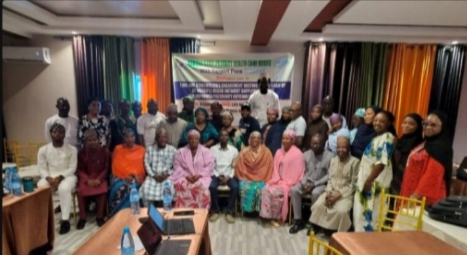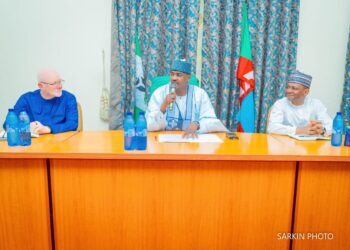The Kaduna State Primary Health Care Board (SPHCB) and UNICEF are taking plausible steps to scale-up ‘Multiple Micronutrient Supplements (MMS)’, in the state to prevent anaemia.
The state’s Commissioner for Health, Umma Ahmed, at a two-day stakeholders’ meeting in Zaria LGA, in Kaduna, urged them to scale up MMS to reduce the negative effects of anemia on pregnant women.
Ahmed, represented by the Permanent Secretary of the Ministry, Dr Aisha Abubakar, said the government and the stakeholders were targeting every pregnant woman and children, saying, ”because they all need MMS.”
According to her, Kaduna State has a 76.1 per cent of anemia in women and children under five, where
more than 56.1 per cent of pregnant women have it.
She equally said 22.1 per cent of men were suffering from it and above 40 per cent for young girls.
Ahmed opined that the data showed that there was a disproportionate value, where men who earn income have access to what they want to eat.
”But women who have to eat based on what is cooked in the house have the worst values.
“It indicates that there are gaps. our mission is to bring it down to zero if possible and to change the negative behavior, encouraging positive practices for their good health,”she said
The commissioner said they were hoping to get the supplements as soon as possible, adding that the stakeholder’s engagement was to get everybody on board.
These include representatives from various Ministries, like agriculture, health, planning officers and CSOs, among others.
“The Federal Government has made available enough funds to secure as much as possible to distribute to the pregnant women.
”For now, we already have a stock of MMS, and this first phase will last till 2025, so it is just to get everybody on board.
“The stakeholders will draw a work plan for distribution, community engagement, advocacy, transportation, supply, and health education in the 23 LGA across the state,.” Ahmed said
Also, the Director of Family and Community Health Services in SPHCB, Nafisat Isah, quoted empirical evidence from clinical trials over the last two decades.
She said that the data has consistently shown that MMS offered additional benefits over Iron and Folic Acid supplements (IFAS) in reducing adverse pregnancy outcomes that negatively impact the first 1,000 days of life and beyond.
She added that MMS enhanced pregnancy outcomes by significantly reducing low birth weight.
She, therefore, urged MMS should be taken by women of childbearing age to enhance childbirth weight.
Isah called on all the stakeholders to work as a team in the move to get the MMS to the citizens in the state.
Earlier, the State Nutrition Officer (SNO) Mrs Ramatu Haruna, said the objective of the meeting was to educate them on MMS and its importance, thereby fostering partnership and collaboration among them.
This, she said, would ensure coordinated and effective approach of scaling up the MMS and secure their commitment to agree on the actionable roadmap with a clear timeline, roles, and responsibilities of the scale-up of MMS”
The UNICEF Nutrition Officer Kaduna Field Office, Yadika Charles, said antenatal MMS supplementation for pregnant women has been proven to improve maternal nutrition status.
He revealed that the MMS intervention campaign was being sponsored by the Bill and Melinda Foundation, adding that only five states in Nigeria, including Kaduna, were currently benefiting from the project.
The nutrition specialist also urged the stakeholders to create an enabling environment for MMS acceptability and intervention to prevent anemia among pregnant women.
According to him, the partnership between UNICEF, the Bill and Melinda Gates Foundation, Alive and Thrive, and Civil Society Calling Up Nutrition in Nigeria (CS-SUNN) was to improve pregnancy outcomes.
The nutrition specialist, who described MMS as a blessing, appreciated the state government for approving N100million as its counter-funding.
He emphasised that MMS was safe, efficacious and cost-effective and it was one of the interventions that improve maternal nutrition and serves as a preventive intervention that should be provided to pregnant women.
Making a case for MMS investment, the Team Lead for Alive and Thrive (A&T) in the state, Mrs Sarah Kwasu, said improvements in natural diet and behavioural change were difficult to achieve over a short time span for populations in resource constrained countries.
She added that combining all micronutrients in a multi-supplement and delivery of a MMS to women in targeted groups is more programmatically feasible and should be embraced.
While Iron and Folic Acid (IFA) supplementation were critical nutrients, Kwasu said that they were not the only nutrients that pregnant women may need to support their health and the health of their child.
She,however, said more than 20 years of research provided clear evidence that MMS was more effective than IFA supplementation in preventing adverse birth outcomes
“MMS is very cost-effective, it can avert 2–3 times more disability-adjusted life years (DALYs) than IFA and have an unprecedented higher return on investment.
”It can drive country-level progress towards global goals and targets to improve anaemia, low birth weight, wasting and stunting.
“It may be considered as a key indicator to measure quality of care for women during pregnancy, along with nutrition counselling.
”Making it available to all women in Nigeria can act as a social equalizer by offering all pregnant women the same standard of care which only affluent women could access,”Kwasu said.
She said that with a thriving pharmaceutical industry, local production of MMS was feasible and may enhance affordability, programme ownership and boost local economies.
Kwasu emphasised the role of A&T in social and behavior change communication, engagement of community volunteers across the LGAs on demand creation, community mobilisation and training of health workers.
This, Kwasu said, would create awareness and enhance the scale up of MMS across the state.
In her presentation, the Project Manager, Accelerating Nutrition Results in Nigeria (ANRiN), Dr Zainab Muhammad-Idris, said pregnancy increases the daily requirement of several vitamins and minerals.
This is to meet the nutritional needs of the developing foetus and other metabolic functions.
She, therefore, said scaling up programmes that deliver MMS to vulnerable mothers was now an urgent priority that requires efficient supply chain systems.
It also needs building awareness of its health benefits among the mothers, communities and maternal healthcare providers.(NAN











